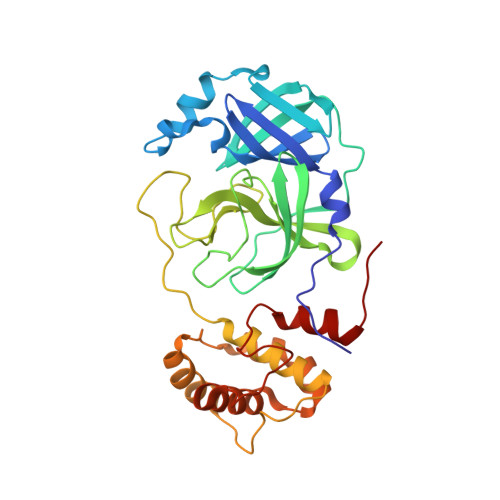DNA-encoded chemical libraries yield non-covalent and non-peptidic SARS-CoV-2 main protease inhibitors.
Jimmidi, R., Chamakuri, S., Lu, S., Ucisik, M.N., Chen, P.J., Bohren, K.M., Moghadasi, S.A., Versteeg, L., Nnabuife, C., Li, J.Y., Qin, X., Chen, Y.C., Faver, J.C., Nyshadham, P., Sharma, K.L., Sankaran, B., Judge, A., Yu, Z., Li, F., Pollet, J., Harris, R.S., Matzuk, M.M., Palzkill, T., Young, D.W.(2023) Commun Chem 6: 164-164
- PubMed: 37542196
- DOI: https://doi.org/10.1038/s42004-023-00961-y
- Primary Citation of Related Structures:
7UR9, 7URB, 7US4 - PubMed Abstract:
The development of SARS-CoV-2 main protease (M pro ) inhibitors for the treatment of COVID-19 has mostly benefitted from X-ray structures and preexisting knowledge of inhibitors; however, an efficient method to generate M pro inhibitors, which circumvents such information would be advantageous. As an alternative approach, we show here that DNA-encoded chemistry technology (DEC-Tec) can be used to discover inhibitors of M pro . An affinity selection of a 4-billion-membered DNA-encoded chemical library (DECL) using M pro as bait produces novel non-covalent and non-peptide-based small molecule inhibitors of M pro with low nanomolar K i values. Furthermore, these compounds demonstrate efficacy against mutant forms of M pro that have shown resistance to the standard-of-care drug nirmatrelvir. Overall, this work demonstrates that DEC-Tec can efficiently generate novel and potent inhibitors without preliminary chemical or structural information.
Organizational Affiliation:
Center for Drug Discovery, Department of Pathology & Immunology, Baylor College of Medicine, Houston, Texas, 77030, USA.















